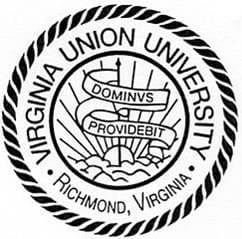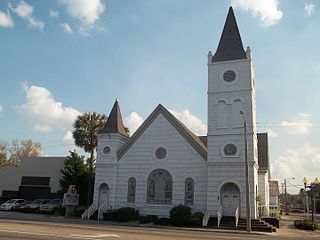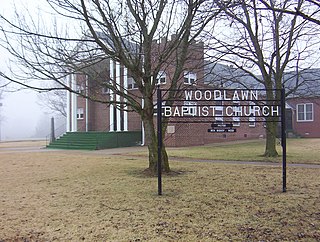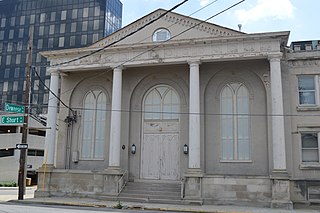History
The First African Baptist Church was founded in 1841 by the black members of Richmond's First Baptist Church, along with some of the members of the Second and the Third Baptist Church as well. The First Baptist Church housed a multiracial congregation from its beginning in 1802 until the white members of the congregation built a new church in 1841. In the years leading up to the split, whites were a minority at the church—a fact which made some of them uncomfortable. Many black members had also called for a split because they were often denied entrance after the building became crowded. [2] After they built a new church building for the white members of the First Baptist Church, the church leadership sold the building that they had been meeting in to the black members. It was then renamed by adding "African" to the title. [3] Most of its early slave members were initially from the Tidewater region of Virginia before they were hired to businesses in Richmond. Many freedmen traveled from other cities to attend its services, as well. [4]
In 1866 James H. Holmes, a former slave and highly gifted preacher, was elected assistant pastor, and in 1867 pastor at the Church. Under Holmes, the church grew by leaps and bounds and became one of the largest churches in the country. In 1871 he baptized 600 people, in 1878 he baptized 1,100. In 1876 the original building was torn down and the congregation built a new church costing $35,000 and installed an organ costing $2,500, which was the largest organ in any African American church, in 1877. [5] The location of both the original church building and its replacement is at the corner of College Street and East Broad Street. [6] The demolition of the original church building was an act which brought accusations of "a true lack of American veneration for old things" from Harpers Weekly . [3] Architect Thomas U. Walter designed the new building, using a Greek Doric temple design. [6] Many of the white congregations in Richmond used a similar style when constructing their churches. [7]
The First African Baptist Church congregation moved in 1955. The church building was then sold to the Medical College of Virginia. Some church members characterized the sale as insensitive to the church's contribution to African-American history. [8] The building now holds offices, classrooms, and laboratories. [6]
Attendance
At the time that the congregation split from the First Baptist Church there were approximately one thousand three hundred black members. [9] It soon experienced rapid growth, and by 1861, the services were regularly attended by more than three thousand people. [1] The number of members swelled to four thousand five hundred by 1869. [10] There was a dispute in 1880 which caused over seven hundred members to leave the church. The New York Times wrote that approximately four thousand members remained after the split. [11]
Events
As one of the largest meeting halls in Richmond, it was often rented for white events. [1] Its large interior and prominent location in Richmond made it a sought after venue for events such as concerts and political rallies. The practice of renting the church was controversial among members due to the use of a church for secular events and due to the racial segregation often imposed at the events. The practice continued, however, due in part to the significant income that it provided. [12]
John Hartwell Cocke lectured on temperance at one of the earliest major events hosted at the church. [12] While the government of the Confederate States of America was based in Richmond during the American Civil War, the church was often used for speeches by politicians including Governor William Smith and President Jefferson Davis. Judah Benjamin also spoke at the church to recruit blacks into the Confederate Army. [13] In 1865 Horace Greely, abolitionist publisher of the New York Tribune spoke at the church regarding the post-Civil War Reconstruction. [3]
Practices
Though it was a Black church from the time of its 1841 separation from the First Baptist Church, it was led by a white minister and a board of thirty black deacons because it was illegal for blacks to preach. [2] Though the majority of the members were slaves in the years before the Civil War, most of the early leaders were freedmen due to greater liberties that they possessed. [14] The first pastor, Robert Ryland, served from 1841 until 1865. Ryland owned slaves and believed that slavery was the best way to convert Africans to Christianity. [1] The church also sent several of its members to Africa as missionaries. [15]
Though Virginia state law did not permit slaves to marry, the church would hold wedding ceremonies for its members. The church allowed slaves to divorce and remarry if their spouse were sold out of state. [1]
Their services were marked by enthusiastic singing and exhortation and were a popular attraction for visitors to Richmond. There was a space located near the pulpit that was reserved for white visitors. Some white residents of Richmond frequently cited the positive tone of services there as proof that their slaves lived happy lives, much to the dismay of their slaves. [16]
Even though it was against state law to teach blacks to read, Ryland published a catechism for members which allowed them to learn to read. This practice caused some controversy, but Ryland defended himself by citing the fact that his lessons emphasized submission to authority. [17] His practice of educating slaves was initially controversial, in part due to a high-profile murder committed by a member of the congregation. Richmond's white churches eventually defused the situation by coming out in support of Ryland's educational programs. [18] Ryland later touted the conservatism of his congregation against those who feared slave rebellions. [19]
Some members were also allowed to occasionally preach from the pews, and some of the lay preachers were purchased from their owners and emancipated with funds raised by the church. [1] It did not gain its first Black senior minister until 1867, however. [6] The first Black man to serve as senior minister was James Holmes, a longtime deacon who was born a slave. [20]

The Southern Baptist Convention (SBC), alternatively the Great Commission Baptists (GCB), is a Christian denomination based in the United States. It is the world's largest Baptist denomination, and the largest Protestant and second-largest Christian denomination in the United States. In 1845 the Southern Baptists separated from the Triennial Convention in order to support slavery, which the southern churches regarded as "an institution of heaven". During the 19th and most of the 20th century, it played a central role in Southern racial attitudes, supporting racial segregation and the Lost Cause of the Confederacy while opposing interracial marriage. In 1995, the organization apologized for its history. Since the 1940s, it has spread across the United States, having member churches across the country and 41 affiliated state conventions.
The Methodist Episcopal Church, South was the American Methodist denomination resulting from the 19th-century split over the issue of slavery in the Methodist Episcopal Church (MEC). Disagreement on this issue had been increasing in strength for decades between churches of the Northern and Southern United States; in 1845 it resulted in a schism at the General Conference of the MEC held in Louisville, Kentucky.

Virginia Union University is a private historically black Baptist university in Richmond, Virginia. It is affiliated with the National Baptist Convention USA, Inc. and the American Baptist Churches USA.

The black church is the faith and body of Christian denominations and congregations in the United States that predominantly minister to, and are also led by African Americans, as well as these churches' collective traditions and members. The term "black church" may also refer to individual congregations, including in traditionally white-led denominations.

Nutbush is a rural unincorporated community in Haywood County, Tennessee, United States, in the western part of the state, approximately 50 miles northeast of Memphis. It was established in the early 19th century by European-American settlers who bought enslaved African Americans to develop the area's cotton plantations. The houses and churches that were built during this time still stand.

Woodlawn Baptist Church and Cemetery, also known as Woodlawn Missionary Baptist Church, is a historic building in Nutbush, Haywood County, Tennessee, in the United States. It is on Woodlawn Road, south of Tennessee State Route 19.

The Bethel Church is a historically-black Baptist megachurch in Jacksonville, Florida, in the United States. Founded in 1838, it is the city's oldest Baptist congregation. The attendance is 12,000 members. The senior pastor is Bishop Rudolph W. McKissick Jr. The historic church building is on the National Register of Historic Places.
George Liele was an African American and emancipated slave who became the founding pastor of First Bryan Baptist Church and First African Baptist Church, in Savannah, Georgia (USA). He later would become a missionary to Jamaica.

First African Baptist Church, located in Savannah, Georgia, claims to be derived from the first black Baptist congregation in North America. While it was not officially organized until 1788, it grew from members who founded a congregation in 1773. Its claim of "first" is contested by the Silver Bluff Baptist Church, Aiken County, South Carolina (1773), and the First Baptist Church of Petersburg, Virginia, whose congregation officially organized in 1774.

Religion of black Americans refers to the religious and spiritual practices of African Americans. Historians generally agree that the religious life of black Americans "forms the foundation of their community life". Before 1775 there was scattered evidence of organized religion among black people in the Thirteen Colonies. The Methodist and Baptist churches became much more active in the 1780s. Their growth was quite rapid for the next 150 years, until their membership included the majority of black Americans.
Wayland Seminary was the Washington, D.C., school of the National Theological Institute. The institute was established beginning in 1865 by the American Baptist Home Mission Society (ABHMS). At first designed primarily for providing education and training for African-American freedmen to enter into the ministry, it expanded its offerings to meet the educational demands of the former enslaved population. Just before the end of the 19th century it was merged with its sister institution, the Richmond Theological Seminary, to form the current Virginia Union University in Richmond.

David George was an African-American Baptist preacher and a Black Loyalist from the American South who escaped to British lines in Savannah, Georgia; later he accepted transport to Nova Scotia and land there. He eventually resettled in Freetown, Sierra Leone where he would eventually die. With other enslaved people, George founded the Silver Bluff Baptist Church in South Carolina in 1775, the first black congregation in the present-day United States. He was later affiliated with the First African Baptist Church of Savannah, Georgia. After migration, he founded Baptist congregations in Nova Scotia and Freetown, Sierra Leone. George wrote an account of his life, an important early slave narratives.

The Silver Bluff Baptist Church was founded between 1774-1775 in Beech Island, South Carolina, by several enslaved African Americans who organized under elder David George.
Robert Ryland was the first president of Richmond College, serving from 1840 to 1866. Prior to the establishment of the college, he had served as the only superintendent of its predecessor institution, the Virginia Baptist Seminary, since 1832.

First Baptist Church was the first Baptist church in Petersburg, Virginia; one of the first African-American Baptist congregations in the United States, and one of the oldest black churches in the nation. It established one of the first local schools for black children in the nation.

Gillfield Baptist Church is the second-oldest black Baptist congregation in Petersburg, Virginia and one of the oldest in the nation. It has the oldest handwritten record book of any black church. It was organized in 1797 as a separate, integrated congregation. In 1818 it built its first church at its current lot on Perry Street.

Historic First Bryan Baptist Church is an African-American church that was organized in Savannah, Georgia, by Andrew Bryan in 1788. Considered to be the Mother Church of Black Baptists, the site was purchased in 1793 by Bryan, a former slave who had also purchased his freedom. The first structure was erected there in 1794. By 1800 the congregation was large enough to split: those at Bryan Street took the name of First African Baptist Church, and Second and Third African Baptist churches were also established. The current sanctuary of First Bryan Baptist Church was constructed in 1873.

Springfield Baptist Church is a Baptist church in Augusta, Georgia was built in 1801 and is a significant historical building for its architecture, religious history, and African American heritage. It is affiliated with the American Baptist Churches USA.

First African Baptist Church is a Baptist church at 264-272 E. Short Street in Lexington, Kentucky. The congregation was founded c. 1790 by Peter Durrett and his wife, slaves who came to Kentucky with their master, Rev. Joseph Craig, in 1781 with "The Travelling Church" of Baptists from Spotsylvania, Virginia.

Lucy Goode Brooks was an American slave who was instrumental in the founding of the Friends' Asylum for Colored Orphans in Richmond, Virginia.


















